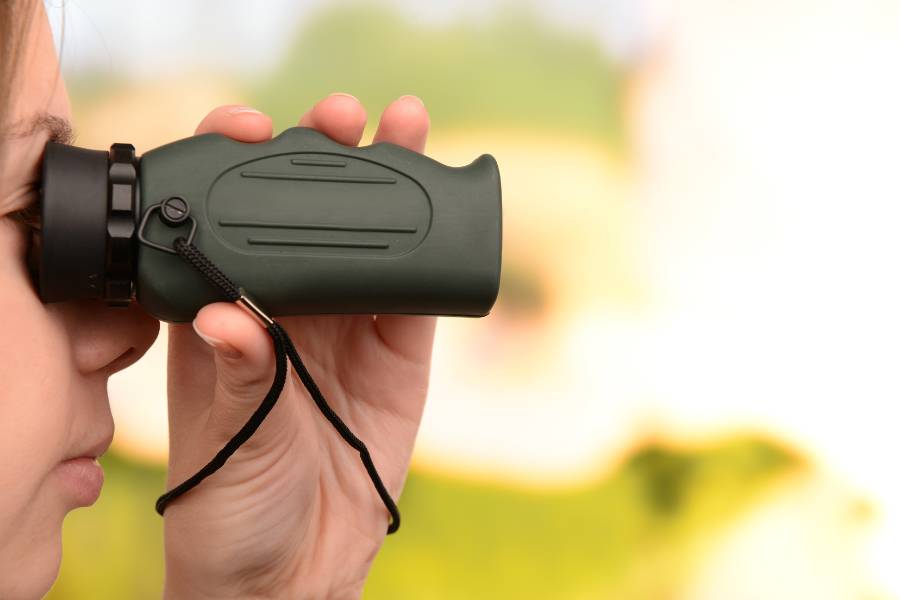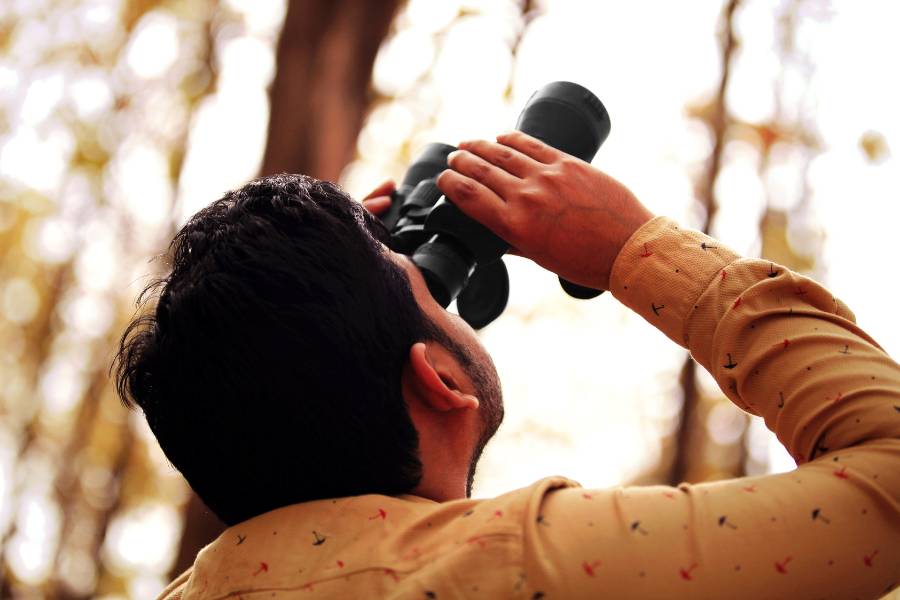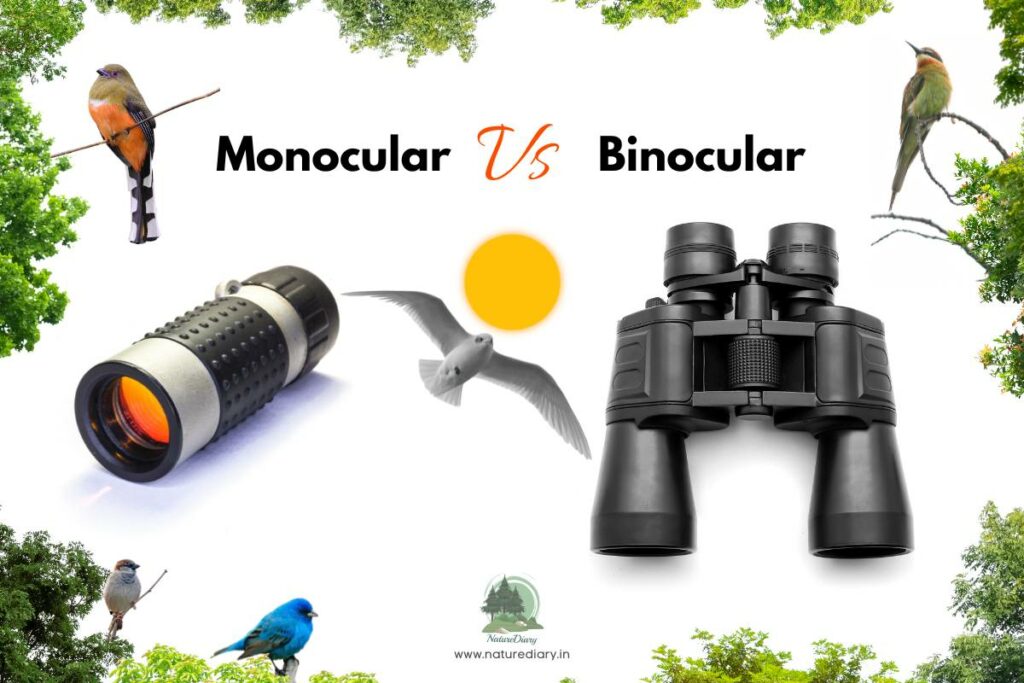Monoculars and binoculars are essential for birdwatching, wildlife observation, or any activity that involves watching something from a great distance. When it comes to a monocular vs binocular comparison, you might find it a little hard to make a choice. Especially if you aren’t aware of the pros and cons of either instrument, you might feel a little lost. However, there’s no need to sweat it, as this article covers exactly what you’re trying to figure out – whether to buy a monocular or a binocular.
Before you buy either a monocular or a binocular, it’s better to be sure that you are making the right choice. After all, both of them have several perks and downsides. Below we will discuss both of them in detail to help you understand which is a better option for you.
What Is A Monocular?
A monocular shares similarities with binoculars as well as telescopes, although it’s much cheaper. Monoculars are quite popular among birdwatchers who move around a lot while birdwatching. Let’s get a more detailed look at what exactly these monoculars are and what benefits and drawbacks they offer.

How Does A Monocular Work?
The simplest and most accurate description of a monocular is that it looks like just one of the two optical tubes of a binocular. It’s basically a very low-powered and portable version of a larger telescope or a spotting scope, which you can hold in your hand and use like a binocular. A monocular uses prisms and lenses to bring faraway objects visually closer. As a monocular is essentially just half a binocular, it’s much more compact and lighter.
Advantages Of Monocular
Even though binoculars allow you to see with both eyes and are more modern compared to monoculars, the latter is still quite popular. This is because a monocular does have a number of advantages, such as-
1. Affordable Price
Firstly, a monocular is one of the most affordable telescopic devices you can buy. Being only half a binocular, a monocular is naturally much cheaper. For individuals who are on a tight budget, a monocular is a very pocket-friendly option.
2. Compact Design
This might seem a little obvious, but the compactness of a monocular deserves special mention. It’s much easier to fit a monocular into your backpack than a binocular, as the latter would take up almost the same space as two monoculars plus the bridge.
3. Lightweight And Portable
Due to their compact design, monoculars are very lightweight. This is yet another reason why they are so popular among travellers. Especially if you plan to go hiking, a monocular will help you greatly by reducing the weight you have to carry.
4. Easier To Use
A monocular is much easier to adjust on the go than a binocular. Unlike a binocular, you won’t have to worry about matching the focus on two optical tubes.
Besides these, a monocular can also double as a telescopic lens for your smartphone. You may attach monoculars to a smartphone camera using a specially designed holder.
Disadvantages Of Monocular
If you had to choose between a monocular and a binocular, keep in mind that the former option comes with certain disadvantages too. These include-
1. Smaller Field Of View
Using a monocular significantly reduces your field of view as it has only one optical tube and allows you to see using only one eye. This might prove to be a little inconvenient if you’re trying to observe a wide area. For instance, if you want to observe the movements of a skittish bird moving around randomly, you need a wider field of view.
2. Uncomfortable For a Long Time
Looking through only one eye while keeping the other shut for a long period doesn’t feel natural. This can make your birdwatching experience a bit uncomfortable by causing more eye fatigue.
3. Lower Depth Of Field
Our binocular vision gives us a major advantage over animals that have monocular vision (eyes on either side of the head) – a greater depth of field. We can perceive more details and better understand depth and distance. The same goes for monoculars too. Images seen through a monocular have a lower depth of field as compared to a binocular. If you are planning to get a new monocular, consider these downsides first.
What Is A Binocular?
A binocular pretty much offers a monocular for both your eyes simultaneously, connected by a bridge. It’s indeed more sophisticated than a monocular and is a very popular instrument among stargazers, birdwatchers, cloud watchers, and wildlife observers.

How Does A Binocular Work?
Like monoculars, a binocular is a viewing instrument that allows you to watch faraway objects by making them appear much closer. However, a binocular allows you to use both eyes, as it has two optical tubes placed side-by-side. You can adjust the distance between the two optical tubes to make the binocular fit your facial structure.
Advantages Of Binocular
Obviously, there are reasons why people weren’t satisfied with monoculars alone and went on to invent binoculars. The latter offers several advantages over a monocular-
1. Better For Long Distance Birdwatching And Astronomy
If your purpose is watching birds at a long distance, or the planets, stars or galaxies but cannot afford a telescope, a binocular is your best option. The best binoculars are suitable for observing distant objects and wildlife, as well as suitable for astronomical requirements.
2. You Can Use Both Eyes
This is the most obvious perk of a binocular. As it has two optical tubes, you can use both eyes at the same time and avoid the eye fatigue that comes from using a monocular for too long. This also helps make the viewing experience feel much more natural.
3. Wider Field Of Vision
When you use both eyes, you naturally gain a much wider field of vision than when using a monocular. This will make it much easier for you to keep track of whatever you are trying to watch.
4. Improved Depth Of Field
You’ll also be able to see more clearly and perceive details better when using a binocular. As mentioned earlier, binocular vision allows for greater depth of field. Especially if you need the instrument for scientific observation, you’ll be better off with a binocular as it offers better optical quality.
Indeed, there’s no doubt regarding why binoculars are more popular than monoculars. You’ll find it much more comfortable to use a binocular for longer periods while also enjoying a wider and deeper field of vision.
Disadvantages Of Binocular
While a binocular overcomes the drawbacks of a monocular, it does so at a cost. The design of a binocular leads to certain disadvantages too-
1. Heavier Than Monocular
Quite obviously, two optical tubes plus a connecting bridge weigh much more than just a single optical tube. This makes binoculars significantly heavier than monoculars – something you should consider if you plan to carry them during trekking/travelling.
2. Bulkier In Size
Along with heavier weight comes a larger size as well. A binocular takes up more than twice the space to pack as compared to a monocular. You’ll find it much easier to pack a monocular as it’s just a cylindrical structure. This is another reason you should think twice about buying binoculars if you move around a lot.
3. More Expensive Than Monocular
As you’d expect, a binocular is also much costlier than a monocular. Binoculars have double the amount of materials compared to monoculars, include additional components, and are more complex. A binocular may not be pocket-friendly enough if you are on a very tight budget.
Hence, binoculars have their own share of drawbacks too, just like monoculars. You should weigh them carefully before you make a purchase.

Monocular Vs Binocular Comparison
| Point of difference | Monocular | Binocular |
|---|---|---|
| Size | A monocular is much smaller than a binocular and takes up about half the space. | A binocular is much bulkier and can be harder to pack into small spaces. |
| Weight and Portability | Monoculars are far lighter and more portable. | Technically, a binocular consists of two monoculars and is double the weight. |
| No. of Lens’ | A monocular has only two lenses. | As a binocular comes with two optical tubes, it has four lenses. |
| Field of View | The field of view is much smaller with a monocular. | Allowing you to use both eyes, a binocular offers a wider field of view. |
| Magnification | Pretty much the same as a binocular. | Pretty much the same as a monocular. |
| Image Quality | Lower image quality due to a shallower depth of field. | Binocular vision comes with greater depth of field, and hence better image quality. |
| Price and affordability | Very cheap and affordable compared to binoculars. | Much more expensive. |
| Comfortability | Can be uncomfortable to use over a long period. | Far more comfortable to use. |
| Best uses | Best suited for long-distance treks and nocturnal observations. | A better choice in almost every scenario, especially if you plan to watch something for a long time or when image quality is important. |
So, Monocular Or Binocular – Which Is Better And Why?
Now you have a clear idea of the advantages and disadvantages of both monoculars and binoculars and can make an informed decision. Neither of the two is the best choice for every individual – it varies from person to person.
However, monoculars are generally better if you have only one functional eye or you do not have the budget for a binocular. On the other hand, a binocular is worth the additional cost, weight, and bulk if you consider its comfort, convenience, and optical quality.
However, regardless of whether you choose monoculars or binoculars, make sure to check out the best products under the chosen category and pick the suitable one you require and can afford.